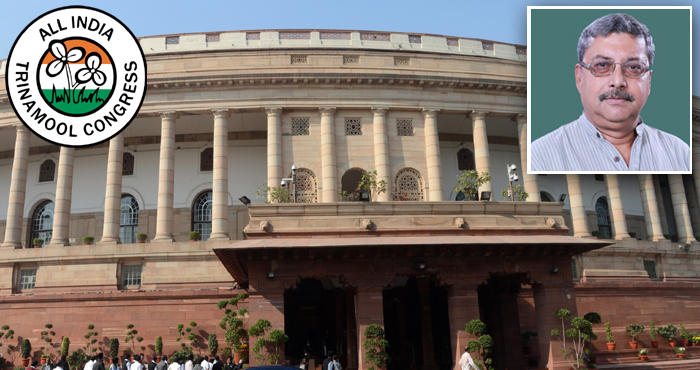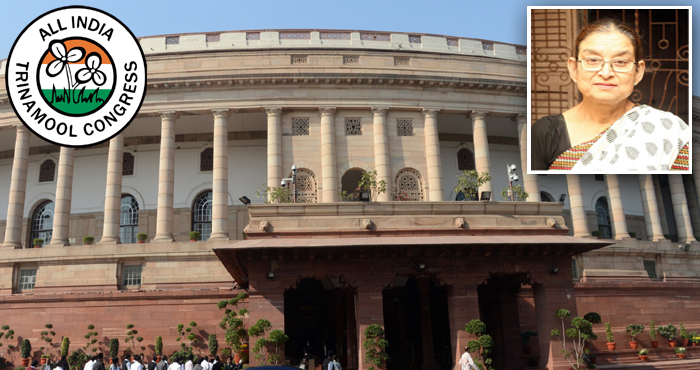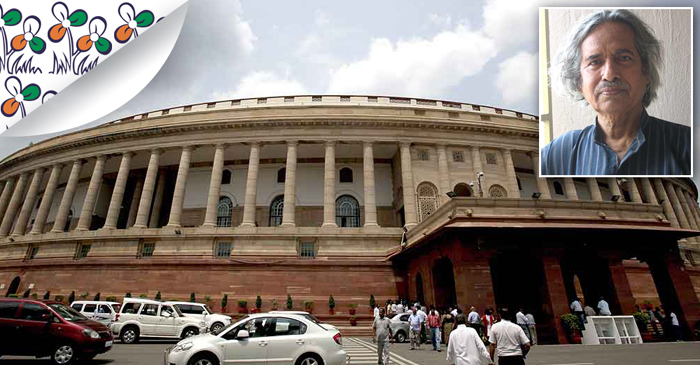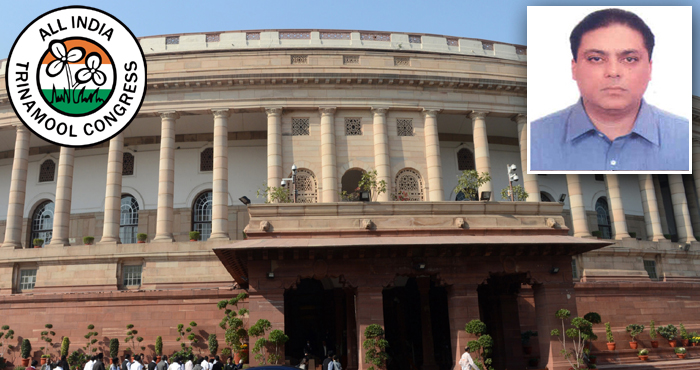West Bengal Chief Minister Mamata Banerjee inaugurated a land bank in South 24 Parganas district today. She helmed the administrative review meeting of the district where she took stock of the ongoing projects. Senior officials of the State administration accompanied her.
During a survey, the South 24 Parganas district administration found that in Sonarpur, Baruipur, Bhangar, Budge Budge and Maheshtala, vast areas of vested land had remained untapped. The total quantum of such land is around 140 acres.
The Chief Minister had launched a project, which she named Sundarini, in South 24 Parganas last year, where the campaign to make the district Open Defecation Free (ODF), increase institutional delivery, drive against malnutrition among children, and showcase some products of the district like honey and Joynagarer Moa were taken up. Today, she inaugurated Anandi, a mother-and-child-care programme under Sundarini. The percentage of institutional delivery has gone up from 65 to 83. This remarkable growth has been possible because of the intense campaign launched as part of Sundarini.
The Chief Minister also launched a mobile app, Paramanna, by means of which one would be able to get all information regarding mid-day meals, and lodge complaints about mid-day meals too. In South 24 Parganas, 13.5 lakh children have been brought under the coverage of mid-day meals. Around 10,000 schools serve mid-day meal every day.
Main points of the Chief Minister’s press conference
- The Centre is delaying fund allocation for various projects.
- The Centre owes Rs 1,700 crore to the State for 100 Days’ Work Scheme.
- The Centre has not disbursed funds for various projects including the building of roads.
- The Centre is unfairly interfering in the State’s jurisdiction.
- The State is taking all measures to combat dengue; we must maintain cleanliness.
- DVC has released 50,000 cusec water today; we have asked DVC not to release more water.
- We have asked the district administration to expedite relief work in Cyclone Aila-affected regions.
- South 24 Parganas was the best performing district in Bengal in the 100 Days’ Work Scheme.
- Institutional delivery centres have increased from 60-65% to 84%.
- We have started mobile camps for the healthcare needs of mothers.
- We have launched three new projects today.
- We have had a positive discussion with all Departments regarding all respects of development.
- We will hold an administrative review meeting in Nadia district tomorrow.
- We will hold administrative review meetings in North and South Dinajpur, and Malda districts this month.
- The new districts of Sunderbans, Asansol and Kalimpong will be created soon
সময়মত টাকা দিচ্ছে না কেন্দ্র: দক্ষিণ ২৪ পরগনায় বললেন মুখ্যমন্ত্রী
আজ দক্ষিণ ২৪ পরগনায় প্রশাসনিক বৈঠক করার পাশাপাশি সেখানে ল্যান্ড ব্যাঙ্কের উদ্বোধন করেন মাননীয়া মুখ্যমন্ত্রী মমতা বন্দ্যোপাধ্যায়। বৈঠকে জেলাশাসক ও উচ্চ পর্যায়ের কর্তারা উপস্থিত ছিলেন।
দ্বিতীয়বার ক্ষমতায় আসার পর এই প্রথম দক্ষিণ ২৪ পরগনায় প্রশাসনিক বৈঠক করলেন তিনি। সোনারপুরের মহামায়াতলার জয় হিন্দ অডিটোরিয়ামে এই সভা হয়। জেলার নানা সরকারি প্রকল্পের উন্নয়ন নিয়ে আলোচনা হয় এই বৈঠকে।
একটি সমীক্ষায় জানা গেছে, দক্ষিণ ২৪ পরগনা জেলার সোনারপুর, বারুইপুর, ভাঙর, বজবজ এবং মহেশতলা এলাকায় অনেক বিস্তীর্ণ জমি রয়েছে। এই জমির মোট পরিমাণ ১৪০ একর। গত বছর মুখ্যমন্ত্রী দক্ষিণ ২৪ পরগনায় ‘সুন্দরিনি’ প্রকল্প চালু করেন। এর মাধ্যমে নির্মল মিশন বাংলা, শিশুদের পুষ্টিকরন ইত্যাদি বিষয়ে প্রচার চালানো হয় এবং জেলার বিভিন্ন পণ্যদ্রব্য যেমন- মধু, জয়নগরের মোয়া ইতাদিকে তুলে ধরা হয়। বৃহস্পতিবার ‘সুন্দরিনি’ –র আওতায় একটি মাদার ও চাইল্ড কেয়ার প্রোগ্রাম ‘আনন্দী’-র উদ্বোধন করেন মুখ্যমন্ত্রী।
মুখ্যমন্ত্রী ‘পরমান্ন’ নামে একটি মোবাইল অ্যাপ্লিকেশন চালু করেন। ‘এই অ্যাপ্লিকেশন ডাউনলোড করে মিড ডে মিল সংক্রান্ত সব তথ্য পাওয়া যাবে। এছাড়াও, এর মাধ্যমে তারা খাবার সম্পর্কে অভিযোগ দায়ের করতে পারবেন। দক্ষিণ ২৪ পরগনা জেলায় ১৩.৫ লক্ষ শিশুকে মিড ডে মিলের আওতায় আনা হয়েছে। প্রতিদিন ৫০০০-১০০০০ বিদ্যালয় মিড ডে মিল দেয়।
বৈঠকের পর সাংবাদিকদের মুখোমুখি হয়ে তিনি বলেন,” কেন্দ্র অর্থ বরাদ্দ নিয়ে টালবাহানা করছে। ১০০ দিনের কাজে যে ১৭০০ কোটি টাকা দেওয়ার কথা কেন্দ্র এখনও তা দেয়নি। রাস্তা থেকে শুরু করে অনেক যোজনার টাকা দেয়নি কেন্দ্র। রাজ্য হস্তক্ষেপ ও রাজনৈতিক বৈষম্যের শিকার।”
ডেঙ্গি নিয়ে সতর্কতা প্রসঙ্গে তিনি বলেন, “চারদিকে খুব বৃষ্টি হচ্ছে। এই সময় রোগের প্রাদুর্ভাব হয়, ভয়ের কোন কারণ নেই। ডেঙ্গি প্রতিরোধে ব্যবস্থা নিয়েছে সরকার, সকলের কাছে আমার আবেদন পরিচ্ছন্নতা বজায় রাখুন।”
তিনি আরও বলেন, “গত বছর ১০০ দিনের কাজে দক্ষিণ ২৪ পরগনা জেলা বাংলায় প্রথম ছিল এই জেলা। আমরা ক্ষমতায় আসার আগে সমুদ্র উপকূলবর্তী এলাকাগুলোয় ডেলিভারি সেন্টার ছিল ৬০-৬৫ শতাংশ এখন তা বেড়ে ৮৫-৮৭ শতাংশ হয়ে গেছে।”
এছাড়া সরকার সম্প্রতি তিনটি নতুন প্রকল্প চালু করেছে। বন দপ্তরের উদ্যোগে নতুন প্রকল্প চালু হয়েছে – ‘গাছের চারা লাগানো’। প্রত্যেক শিশুর জন্মের সঙ্গে সঙ্গে তাদের একটি করে গাছের চারা দেওয়া হবে। ১৮ বছর বয়স হলে তারা ওই গাছ বিক্রি করে তাদের প্রয়োজনীয় অর্থ পেয়ে যাবে। শাল, মেহগনি এই জাতীয় গাছের চারা দেওয়া হবে তাদেরকে।
৩০০০ কবরস্থানে প্রাচীর তৈরি করে দেওয়া হয়েছে। সরকারি জমি গুলি নিয়ে একটি সমীক্ষা হচ্ছে। যেসব শ্মশান সরকারি জমিতে রয়েছে সেগুলিকে প্রাচীর দিয়ে দেওয়ার ব্যবস্থা করা হচ্ছে। এই প্রকল্পের নাম ‘বৈতরণী’।
গরীব মানুষদের সৎকারের জন্য রাজ্য থেকে ২০০০ টাকা দেওয়া হবে, এই প্রকল্পের নাম ‘সমব্যাথী’।এরকম অনেক নতুন প্রকল্প যেমন খাদ্যসাথী, কন্যাশ্রী, যুবশ্রী ইতাদি চালু হয়েছে।
“সব দপ্তর নিয়ে বিস্তারিত আলোচনা হয়েছে, খুব পজিটিভ আলোচনা হয়েছে।আজ ৫০ হাজার কিউসেক জল ছাড়ছে ডিভিসি। বেশি জল ছাড়তে বারণ করেছি। এছাড়া, আয়লা অধ্যুষিত এলাকায় যেটুকু কাজ বাকি তা তরান্বিত করার কথা বলেছি” , জানান মুখ্যমন্ত্রী।










